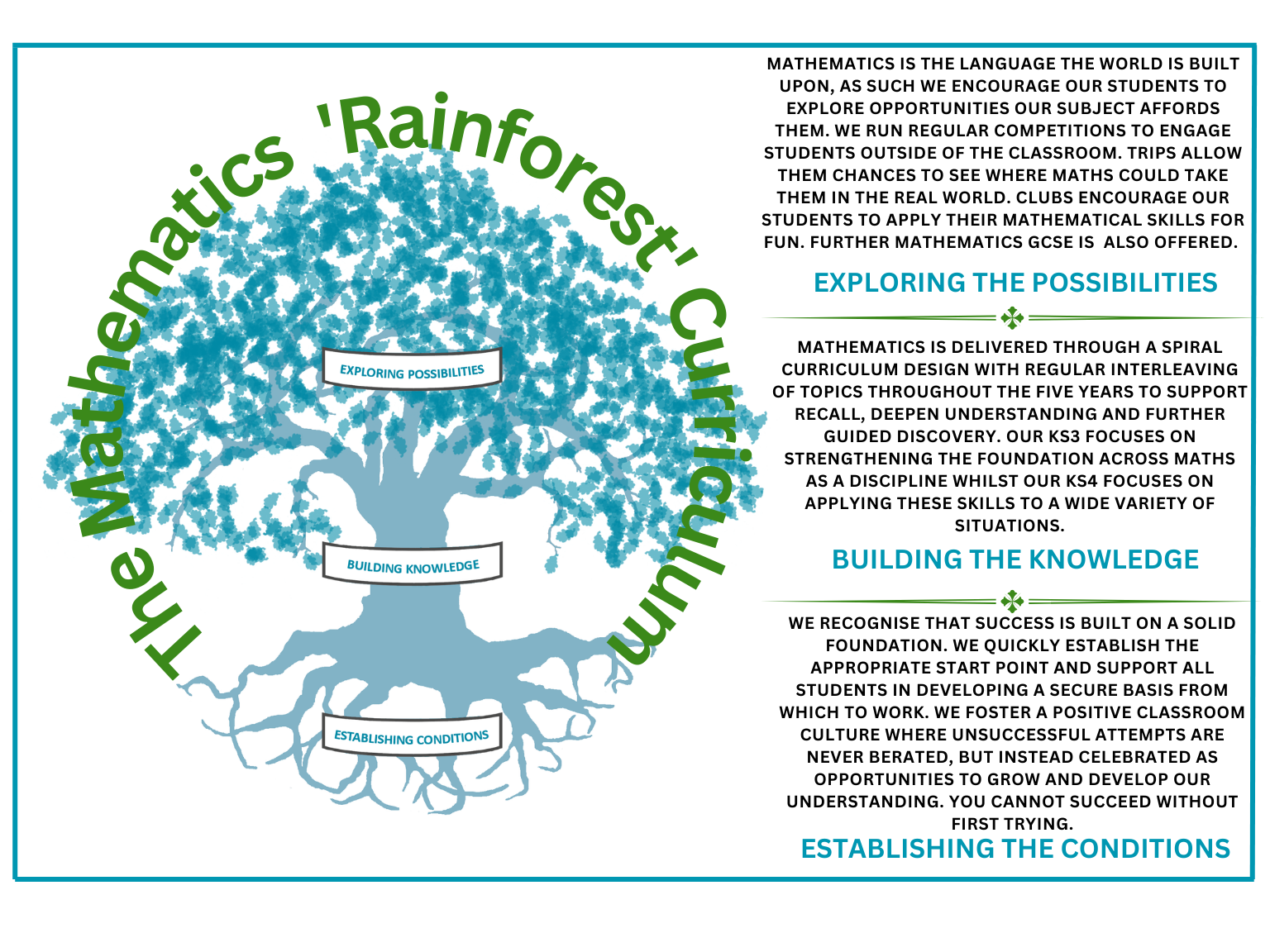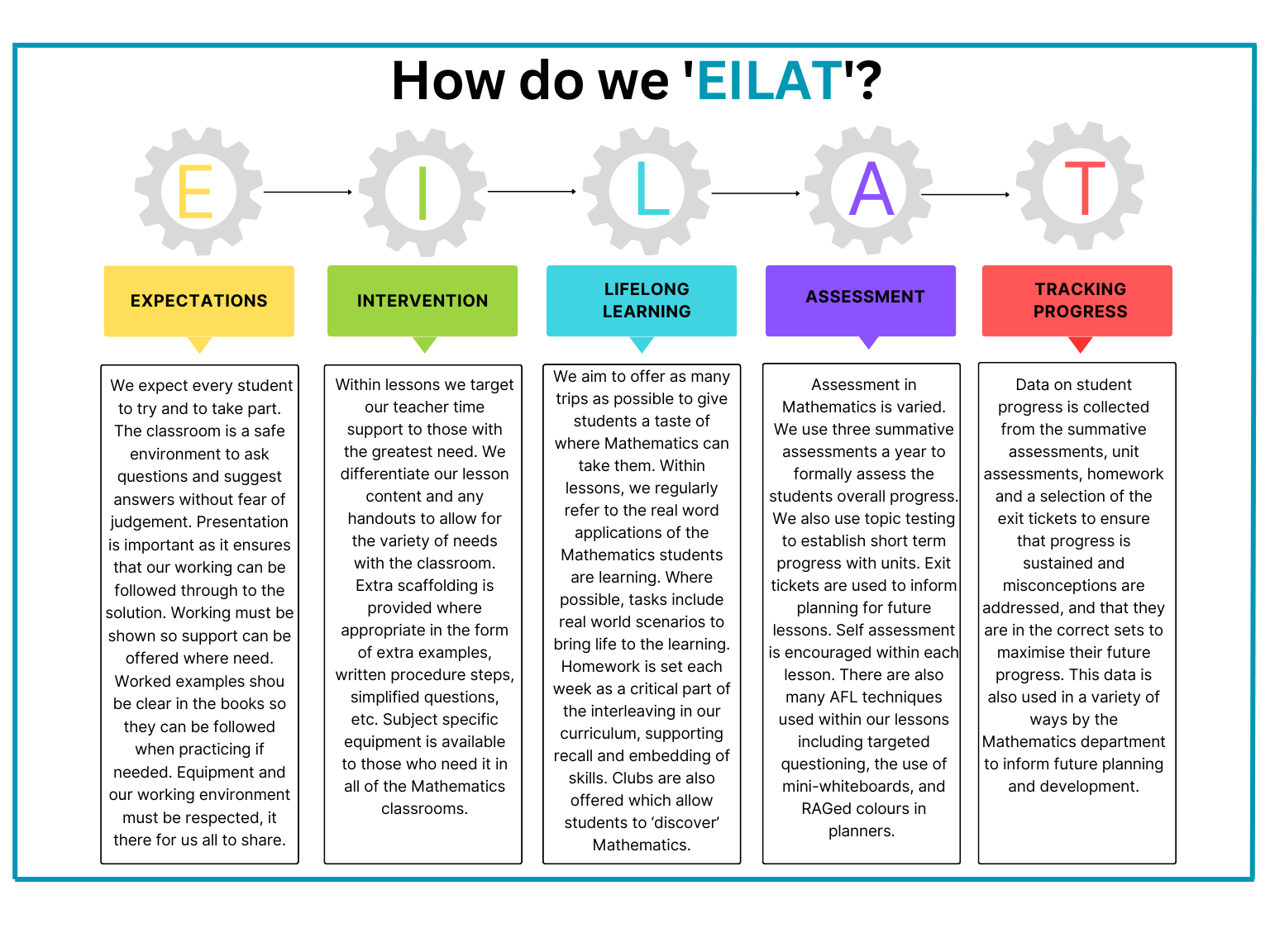- Home
- Curriculum
- Subjects
- Mathematics
Mathematics
'Mathematics is the language of the universe'
Intent
In Mathematics we aim to develop students who value, understand and enjoy mathematics and are able to reduce its complexities into something much simpler.
Through their study of Mathematics, we aim to:
- Secure each student’s fundamental skills of learning in terms of numeracy and Mathematical literacy.
- Develop each student to become confident and fluent with a broad range of mathematical skills needed to function in the real world.
- Provide students with the ability to approach problem solving in a logical and analytical way.
- Develop learners who can apply mathematical skills to a variety of situations.
- Developing the love and understanding of STEM and open opportunities to follow STEM career pathways upon leaving Jubilee High School.

Meta-concepts
The following meta-concepts underpin our curriculum:
- Number – The foundation of all Mathematics. Number includes place value and manipulation of integers, decimals, fractions, percentage, ratios.
- Algebra – Variables are a key tool in the application of Mathematics to all walks of life. Algebra allows us to work with these variables in any content by assigning them letters. We apply our number skills to formulae, expressions, equations, functions, sequences, etc. through the use of Algebra.
- Ratio and Proportion – From getting our fair share to paying a fair price, Ratio and Proportion helps us to understand real world problems such as scaling recipes, getting the best buy in a shop, or changing our money for our holidays.
- Geometry and Measures – The real world relies on Mathematics to shape its physical form. Geometry and Measures explores 2D and 3D shapes and space form observing to creation.
- Probability – Our path through the world is built on choices. Probability helps us to understand the impact of decisions and how to calculate the chance of a favourable outcome.
- Statistics – The world around us is packed full of data, much of it in an unfriendly or inaccessible form. Statistics help us to analyse and interpret data from a range of sources in a range of ways to make it much more accessible and useful to everyone.
Mathematics curriculum sequence
Implementation
Our Mathematics curriculum is designed to enable students of all abilities to develop their Mathematical thinking and problem-solving skills, apply these to real world situations and challenge their preconceptions of what they can achieve. To achieve this effectively we have very carefully ordered our topic coverage to ensure the logical development of skills and knowledge through the five years at Jubilee High School. We embrace a spiral structure to build skills in layers throughout the curriculum with interleaving to deepen understating through recall, repetition and extension.
Key Stage 3
Our vision for Key Stage 3 is to develop a strong foundation in all of the topic areas and Mathematical thinking skills that will be relied upon moving into Key Stage 4 and beyond.
We aim to make Mathematics fun and help the students to find value in it through links to the real world. We highlight where and when the skills will be needed inside and outside of the classroom and the school. We encourage experimentation, trial and error as learning tools and support all learners in finding ways to make problems more accessible and solvable.
Year 7 starts with consolidation and extension of the core number skills brought forward from Key Stage 2, without which the rest of the curriculum would become inaccessible. By Christmas we move onto an introduction to Algebra, using letters to represent variables, opening up access to an exciting world of problem solving. We continue to focus on different foundation building blocks throughout the year, using Do It Now exercises and Homework to continually recall and embed the skills already covered.
Year 8 is an opportunity to further develop the use of Algebra and Number skills in a broader context an introduce yet more new exciting areas of Mathematics, previously unseen by the students such as Trigonometry and Vectors.
Year 9 takes the groundwork of years 7 and 8, consolidates and extends it in preparation for Key Stage 4. by the end of year 9 the students will have the necessary tools to tackle the more advanced elements of the curriculum through the GCSE.
Key Stage 4 (Year 10 –Year 11)
Key stage 4 expands students’ opportunities to apply logical thinking, reasoning and justification skills to their knowledge. This builds students’ confidence to be more determined and resilient when tackling the more rigorous demands of GCSE style content.
Year 10 is designed to develop fluency and reasoning skills. With the strong foundations from Key Stage 3. We now extend the students, exploring more challenging elements of each topic area and blending topics together to tackle ever harder problems.
Year 11 takes the students deeper into more challenging topics with the aim of developing application of skills, proof skills and to interpret information with fluency. Our goal is for students to be confident with practical Mathematics for life beyond the classroom. The topics covered in Year 11 allow students to fully embed those skills and ensure that they are confident with a broad range of problems before they tackle their GCSE examinations. Further Mathematics GCSE is offered as an additional course to stretch and challenge those who wish to take Mathematics or other STEM subjects at the next level.

GCSE specification- Mathematics
Impact
As they move through the spiral curriculum our students will learn the value of Maths as skills for life in the world after Jubilee High School. They will see their knowledge, skills and confidence grow as they learn to tackle problems of any size by breaking them down into manageable steps. With success comes enjoyment, and it is our goal for all students to enjoy Mathematics in whatever form it takes for them.
When it comes to the day-to-day tasks of shopping, cooking, reading a train or bus timetable or managing their money, our students will be ready to apply the skills they have learnt with us. For those going onto further education or into the world of work, they will have the understanding they need to build upon in any STEM sector and in other practical applications such as construction, design, music or finance industries. Our students will all be life-long users of Mathematics.



